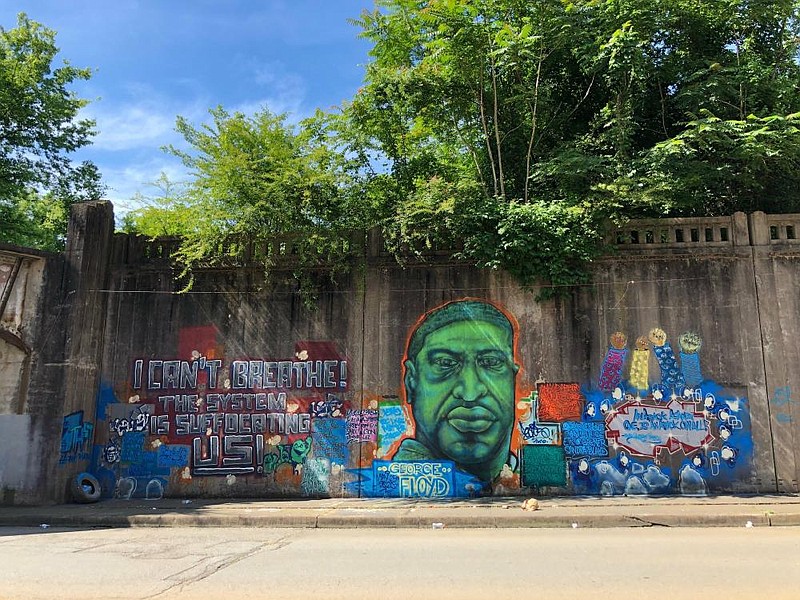The guilty verdict against former Minneapolis police officer Derek Chauvin in the death of George Floyd was greeted in Little Rock with relief and even some tears.
"I broke down crying," said Jermaine Gibson, who along with Jose Hernandez painted a mural of Floyd on a railroad overpass wall in Little Rock. "I haven't cried since the protests [after Floyd's death last year], since they congregated at that wall and I spoke to everyone."
The verdict on three counts against Chauvin, announced just before 4 p.m., capped what had been an anxious day for local law enforcement authorities.
Just before the verdict was announced, officers began to prepare for protests at the steps of the state Capitol building. At 3:45 p.m., State Capitol Police began arranging barricades on streets leading to the Capitol grounds, including shutting off access from West Capitol Avenue near Victory Street.
Once the verdict was announced, officers could be seen guarding the barriers, but no protesters were in sight. One officer told a reporter that he did not know how long he would be kept there.

Pulaski County Sheriff Eric Higgins told a reporter that he thought the decision in the Chauvin trial would relieve many in the community.
"I think it's important," Higgins said. "I think its probably a relief for some of the members of the community."
Higgins said the push to hold officers accountable is key, but he insisted that justice system changes are particularly important.
"Obviously we want to hold our deputies accountable for their actions and conduct, but a lot of the push that you're seeing for reform -- we have to have pressure from the outside for the police agency's reform," Higgins said. "But it's also the criminal justice system because in this case the [Minneapolis Police] Department did the right thing with terminations and pursuing charges."
Dianne Curry, president of the Little Rock NAACP, said she was happy that justice was given to Floyd's family.
"We are just proud that justice prevailed in this situation," she said. "That is all we can ask in a situation like this. It is about fairness. It has to be based on facts of the matter. It has to be a unanimous decision. It has to be proven, and all of the evidence was there."
Shortly after the start of a Little Rock Board of Directors meeting at 6 p.m., Mayor Frank Scott Jr. asked for a moment of silence to invoke justice and peace before officials turned to the meeting agenda.
Almost a year has passed since Gibson and Hernandez painted the mural of Floyd on the concrete wall underneath two railway bridges over Seventh Street, but the emotions painted on the wall remain.
Gibson said he was at work watching when the verdict was read, and he was overwhelmed by emotion.
"I got to meet Floyd's relatives privately when they went to see the mural," he said. "He discussed how good it felt to see Floyd's face on the walls of a city he had never visited. As long as his face is on that wall, then nobody can ever forget."
The mural includes the names of other people of color killed by police or in racial violence -- Emmett Till, Ahmaud Arbery, Tamir Rice, Eric Garner, Breonna Taylor, Trayvon Martin, Philando Castile, Bradley Blackshire of Little Rock and more.

Gibson said the names are the reason why the guilty verdict might seem small, but he believes it is a watershed moment.
"If they keep killing us, then we will keep putting names on that wall," Gibson said. "But I truly believe this is a turning point. It showed that police officers can no longer just treat us any kind of way and get away with it. This moment was just kind of this big sigh of relief. I just thought to myself: 'Finally.'"
Scott Hamilton, interim president of the Urban League of Arkansas, also called the verdict a relief and said race isn't the root of the issue.
"I think people are breathing a sigh of relief all over the country and all over the world," Hamilton said. "This is not a race issue. This is a human issue. When we have a case this egregious and in your face as this, when you watched a man die on your screen, I think everyone on this planet has to say, 'OK, do we have a planet that manages something like that in a manner that you can walk home and feel good?'"
Hamilton said that if the jurors had acquitted Chauvin, then he would have had serious questions about whether the system works.
"If this were a not guilty verdict, I think we would have an entire globe that would question whether we have anything that works in this society," he said.
Arkansas Stop the Violence Director Benny Johnson said the correct verdict was obvious to him.
"It was very obvious he was guilty from the beginning," Johnson said. "He went way overboard, and now he's going to have to pay for what he did."
Johnson said a lot of work must be done in order to form a good bond between communities and law enforcement officials.
"It's well known that south of [Interstate] 630, instead of police protecting and serving, some officers have a mind that they want to patrol and control," Johnson said. "That's not it. You can't treat people in the community like they're nobody. Then you want to come back and ask those same people that you have mistreated for information?"
